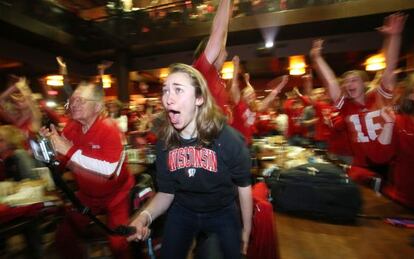US college basketball: the collective madness that defines a country
Millions of Americans will be glued to Monday’s NCAA final

After making it through five qualifying rounds in just over two weeks, Duke and Wisconsin on Monday face off in the final of the NCAA men’s basketball tournament in the United States.
Behind the game, which will be broadcast at primetime, there lies a multimillion dollar industry, a social phenomenon that brings an entire country to a standstill, and a university system that cannot be understood without its sports component.
The final in Indianapolis is the climax of what Americans refer to as March Madness: 19 days during which college basketball dominates most conversations, millions of people are glued to their TV sets, and vast amounts of money trade hands among friends, work colleagues and fellow students.
After playing the regular league, 64 universities from all over the US face one another in single-elimination games that are part of a nationwide tournament organized by the National Collegiate Athletic Association (NCAA).
When your team wins, the increase in cash gifts is enormous because you feel happy”
Andy Markovits, politics professor
Before the tournament begins, millions of Americans place their bets on the likely winner of each game. The goal is to correctly guess all the outcomes. Bets range from just a few dollars among friends to high stakes at Las Vegas betting parlors.
This collective madness accounts for a drop in productivity at work that costs the economy an estimated $1.9 billion, according to one consulting firm. During the first four days of the tournament, 40 million Americans (around 12 percent of the population) bet $9 billion, according to another study. This is more than the estimated $7 billion that was invested in Barack Obama’s 2012 presidential campaign.
Just like he does every year, President Obama picked his winners in a televised interview with ESPN. And while he correctly had Duke reaching the finals, he predicted that the team would be beaten by Kentucky, which in fact lost to Wisconsin in the semifinals on Saturday.
Getting all the matchups right is difficult: barely 1.6 percent of those who made their picks on ESPN’s Tournament Challenge application accurately predicted the correct semifinals teams.
Andy Markovits, who teaches comparative politics at the University of Michigan, Ann Arbor and has written extensively about sports culture, says this is due to the fact that college basketball is the only “national sports event.” Americans, he notes, are not very interested in the Olympics, and only show an interest in their own team in the professional basketball, baseball and American football leagues.
“The entire country follows this tournament for three weeks,” he said in a telephone interview. The key, he argues, is its unpredictability, as everything comes down to single-elimination games played in courts all over the country.
This collective madness accounts for a drop in productivity that costs the economy an estimated $1.9 billion
College basketball fever is especially high among the faculty, students and alumni of the universities whose teams reach the qualifying rounds. This link between universities and sport is very strong.
“Beginning in 1830, sports became important [to universities]. It is a source of pride and distinction,” notes Markovits.
The first national college basketball tournament was held in 1939. University leagues have since become a controversial business. A campus will invest in facilities and compete with others to attract the best players with scholarships, even when it is not academically justified. There have even been not-so-infrequent accusations of academic score manipulation to help good athletes get through their studies.
The NCAA runs a highly profitable business, television broadcasting rights are extremely high, and some coaches make the same salaries as stars. The players don’t get paid, but are provided with a showcase for their talent that can earn them a professional contract.
On Monday evening, Duke and Wisconsin will compete for honor and for money. Winning the championship, says Markovits, will increase general interest in the university, which will in turn attract students and donations.
“When your team wins, the increase in cash gifts is enormous because you feel happy,” he notes.
Tu suscripción se está usando en otro dispositivo
¿Quieres añadir otro usuario a tu suscripción?
Si continúas leyendo en este dispositivo, no se podrá leer en el otro.
FlechaTu suscripción se está usando en otro dispositivo y solo puedes acceder a EL PAÍS desde un dispositivo a la vez.
Si quieres compartir tu cuenta, cambia tu suscripción a la modalidad Premium, así podrás añadir otro usuario. Cada uno accederá con su propia cuenta de email, lo que os permitirá personalizar vuestra experiencia en EL PAÍS.
¿Tienes una suscripción de empresa? Accede aquí para contratar más cuentas.
En el caso de no saber quién está usando tu cuenta, te recomendamos cambiar tu contraseña aquí.
Si decides continuar compartiendo tu cuenta, este mensaje se mostrará en tu dispositivo y en el de la otra persona que está usando tu cuenta de forma indefinida, afectando a tu experiencia de lectura. Puedes consultar aquí los términos y condiciones de la suscripción digital.








































